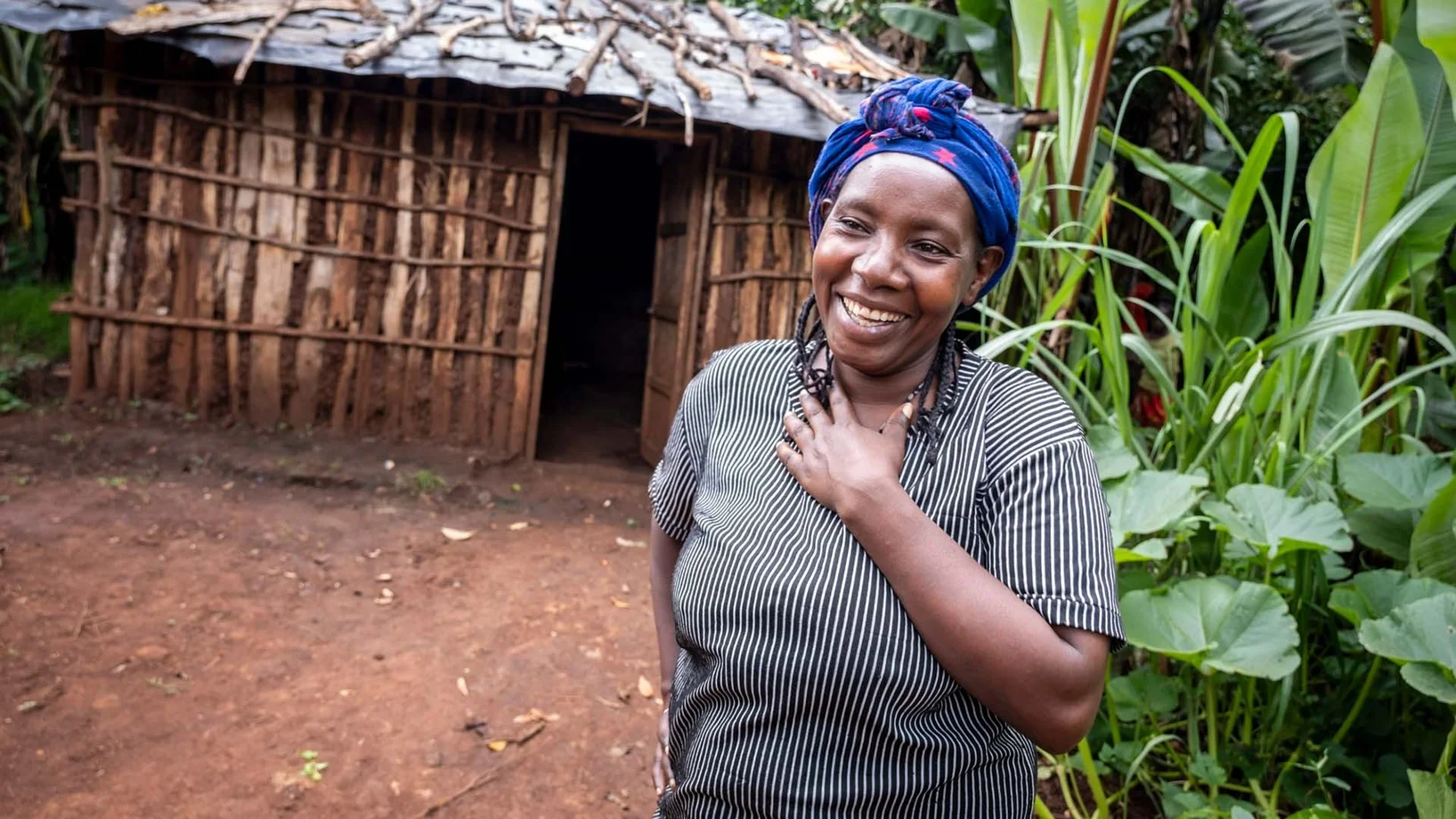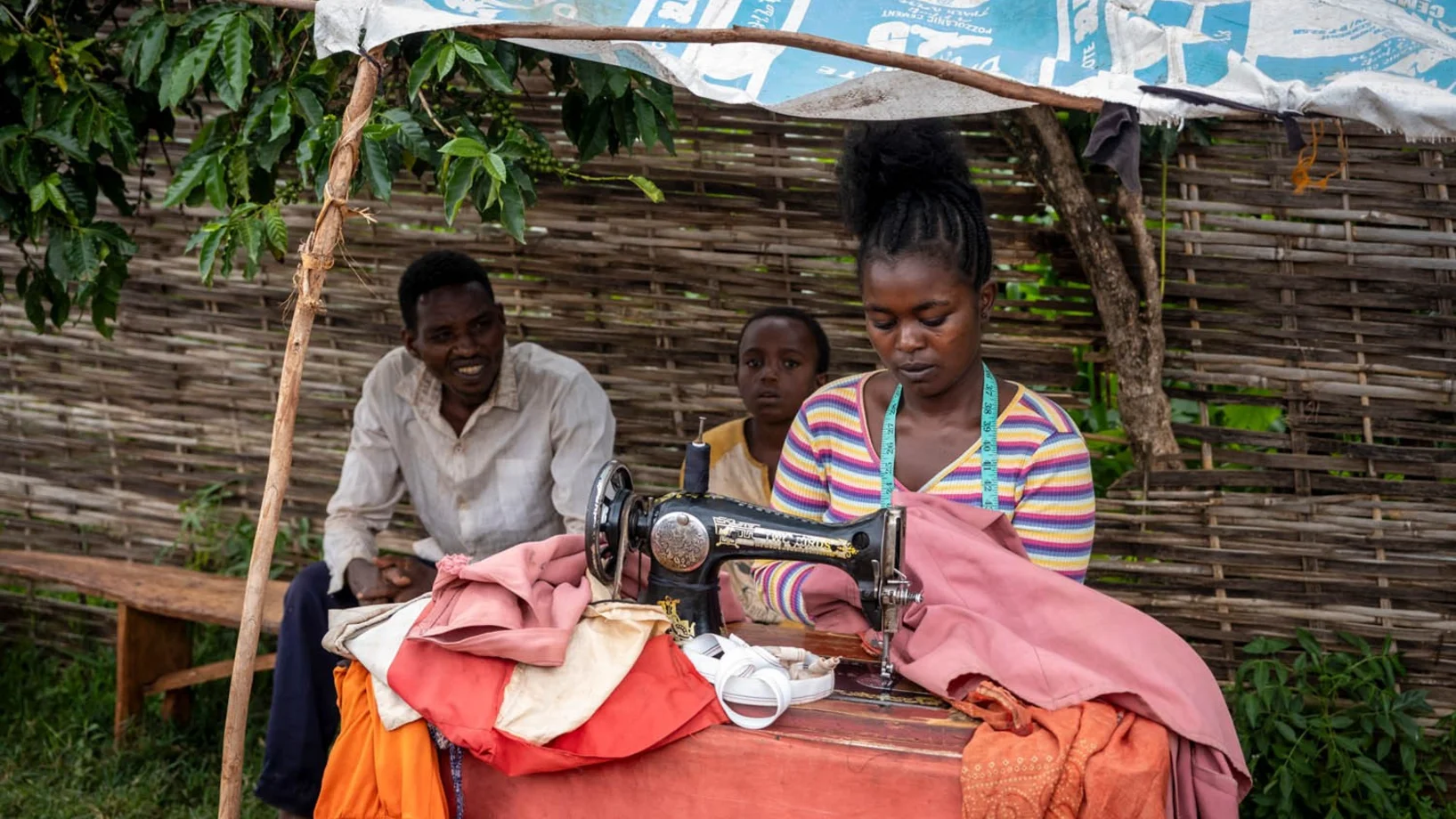Endashaw Alemu travels many kilometers on foot every day. He marches from farm to farm in the Ethiopian district of Fogera. The young agricultural advisor has the same task everywhere: he encourages people to make changes. So that they can defeat poverty and hunger.
HE RUSHES ACROSS CLAY PATHS, then Endashaw Alemu hops from stone to stone, over a stream, jumps up a field and sees the next crooked tin-roofed house: one of the scattered farmsteads in Fogera. Asenakew Mekonen, 55, lives there with his wife and children. The farmer is a small man with big hands. He greets the guest with a warm look and leads over to the small forest that he was able to plant with the help of Menschen für Menschen: The silver oaks, only two years old, are already several meters high in some cases. The young agricultural consultant Endashaw is interested in the bushes between the trees, which the farmer also received from Ethiopia aid. The Ethiopians call it Gesho, a plant that is used for brewing beer. “The bushes are healthy,” Endashaw says to the farmer. “It’s good that you water them regularly!” The first leaves of the bush can be sold after just one year. “Gesho brings good money on the local market,” explains Endashaw. “The farmers use this to buy fertilizer, clothing and also basic foodstuffs."
The first silver oaks, which shoot up quickly in this climate, can be felled after five years. The slender trunks are valuable timber: the walls of the houses traditionally consist of a framework made of poles that are plastered with clay. The farmer explains that teff is even more important to him than the trees: “Endashaw showed us a new cultivation method,” reports the small farmer. Until now, Asenakew planted the teff as his ancestors had done for thousands of years: his lean oxen scraped up the soil with a simple hooked plow. Then he threw the grain over the field by hand. Large parts of the seeds dried up or were eaten by birds. The harvest remained small. “But now I make furrows in the ground, 20 centimeters apart,” explains Asenakew. “I fill a small plastic bottle with the teff seeds.” Teff is also called annual bunch grass: the seeds are tiny, barely measuring a millimeter. “Then I burn a hole in the lid with a hot needle,” the farmer continues. If you now walk along the furrow with the bottle, with the lid down, the seeds will trickle out like sand between the glasses of an hourglass - not too much, not too little.

It also helps that Asenakew received improved seeds and mineral fertilizers from people for people . “The families can double their harvest this way,” says consultant Endashaw. It is not easy to convince farmers of innovations. Trying something new is a risk for them. The result can only be seen after many months, during the harvest. Change takes courage - especially because living conditions are becoming increasingly precarious as the population grows. When the old die, the young divide the inheritance. With each generation the land per family becomes even smaller. Each family now has an average of 0.3 to 0.4 hectares of land available. This is equivalent to half of a football pitch. Nobody can survive on that – at least not with the traditional economic system. So hunger creeps over the threshold and spreads in the huts for many months of the year - until the new harvest finally brings relief. But only for a while before supplies run out again. That's why Menschen für Menschen. The families receive a variety of suggestions on how to diversify and increase their harvests and thus their income despite the small fields. This includes material aid such as tree seedlings or high-performance seeds, which they receive on the basis of microcredits. But even more important is the dissemination of new knowledge and new methods. A total of eight agricultural advisors work at the grassroots: They live in the project area among the farming families, often alone. Endashaw is lucky. His young wife, a trained business economist, is on maternity leave and has moved in with him; the young couple has a one-year-old daughter.

“I was initially skeptical about Endashaw’s suggestions,” says farmer Asenakew. “But he came every day and finally I trusted him.” He has no more regrets about the new ideas than farmer Tegegne Kebede, 42. His house is the next stop for Endashaw today. The farmer shows him the compost he made three months ago with tree leaves, bean straw and cattle dung. The hard-working helpers contributed Menschen für Menschen: packs of moist earth containing hundreds of earthworms. The two men reach into the compost with their hands full. It is loose, dark, almost black. Endashaw holds a handful in front of his face: “Smells nice! An important criterion for quality.” Tegegne can put the compost to good use: Above all, he uses it in the planting holes for the mango seedlings that he receives from Menschen für Menschen.
“But the most important thing for me was that I received corn seeds on the basis of a loan,” explains Tegegne. The farmers pay back these microloans for seeds to a cooperative, which uses the repayments to issue new loans. “Without this opportunity, I would have had to borrow money privately.” The interest rates charged by local lenders are horrendous and are a major reason why the families are in the poverty trap: “After the harvest I would have had to pay back twice the amount!”
The farmer says they can not only buy food and mineral fertilizer from the sale of the young sheep, but also school supplies for their two daughters, 18 and 15 years old, and their 12-year-old son. Another innovation is very important for his wife: “I used to cook on an open fire,” says Wolela Agmas. “My eyes watered for hours because the smoke was so murderous. And the flames burned my legs." Endashaw convinced them of the advantages of a simple stove made from a handful of concrete elements: “We now need a lot less cow dung and wood as fuel.” The manure can now also be used for compost. There is less wood to cut and collect, which is traditionally the work of girls: now they have more time for school.

Endashaw himself has experienced that education is the path to development: “I know what poverty feels like.” He also comes from a small farming family. His older brothers had to help with farming at an early age and had to give up school. But he was allowed to get an education. Perhaps he will recognize his younger self in Hailemikael, the son of farmer Asenakew Mekonen (seen on our homepage). The eleven-year-old is the best student in his class of 54 students. The lessons could be better, because no new textbooks have arrived at the remote school, which is why the children have to copy a lot from the blackboard. But nonetheless, the boy has big dreams. “I would like to become Prime Minister of Ethiopia one day,” says Hailemikael and smiles. “Then I’ll develop the country – and everyone will have enough to live on.”












